|
Trip to China
All Days
|
Previous Day
|
Next Day
Tuesday,
August 5, 2008
MAOMING
We're acclimating a little better now so it's becoming
more difficult to get up at 5:30 in the morning. I think
we finally rolled out at about 5:45, but we were leaving
at 7am and still needed to get breakfast. The boys went
down early with Dad and Lori and we got to breakfast with
about 10 minutes to spare.
We crammed whatever we could eat, took a quick trip to the
cash machine (it spits out Yuan, more on that later), and
then we were off to the van.
Our guide for the day, Shelly, works for Lotus travel, but
is one of Holt's contracted guides. She is one of the few
guides that can speak Cantonese, Mandarin, English, and
one other Chinese dialect fluently. She also has friends
in Maoming and is familiar with the area. We were very
fortunate to have her because we've already gotten to know
her from past adventures.
Our driver for the day was Dale Earnhart Jr. Let me just
say we're lucky to be alive. The vehicle was a Mercedes
van and seated 12. It was actually relatively comfortable
and the large windows gave us optimal viewing room of all
the close calls with death we would experience throughout
the trip.
Lane markers on Chinese roads are merely suggestions. The
Chinese are masters at turning a two lane highway into a 5
lane interstate, with only inches to spare on either side
of a vehicle. The Chinese way of driving is normal and
customary to any Chinese, but is absolutely terrifying to
an American. I now know why the Chinese don't rent cars to
foreigners. It probably has to do with further pollution,
but culturally you simply would not survive on the road.
At one point our driver was "drafting" behind a petrol
truck. ("Drafting" is a term used in car racing in which
one car gets as close as possible to the car in front of
it to cut down wind resistance and conserve fuel.) The
hazardous materials diamond indicator on the back of the
truck was square in the windshield in front of us.
Exiting Guangzhou, we entered a city called Foshan. Foshan
is known for its tire production so you'd see
advertisements for tires as far as the eye can see.
We then crossed a great bridge. In Portland Oregon there
is a bridge called the Fremont Bridge. The bridge is
exceptionally high in order to allow tankers to pass
underneath. This bridge in Foshan was probably another 25%
higher than the Fremont however several months ago, a
supertanker hit one side of it and destroyed the lanes on
that side. Shelly explained that the broken pieces of the
bridge were actually hanging down until they finally
removed them just recently. Now it's under construction
again, at the same height. I bet they'll regulate it a
little more heavily from now on.
Once passed the bridge we entered farmland for the balance
of the trip to Maoming. We'd now driven about 45 minutes.
Chinese villages all have a couple common characteristics.
First, the buildings are all 2-3 stories high and have a
common owner. The owner then rents the buildings to
multiple families. At the entrance to every village there
is a pagoda-like entry monument with a Chinese inscription
on it. If I remember correctly, it usually wishes the
guest safe passage. The villages generally sit uphill from
the myriads of rice paddies. Some villages have more
extensive farmlands than others but it's a general layout
that repeats itself hundreds of times along the route.
Today was during the 2nd harvest for the year and many of
the farmers were out working the rice paddies. Many were
using big gray oxen to help with the burden and fewer were
using machinery. The tilling machines reminded us of a pod
racer out of Star Wars or something. The machines had a
bulging front end where the engine was, tapering down to
the tilling blades at the back end. The driver stood just
in front of the tilling blades. The wheels were metal and
had enormous teeth, like gear teeth, on them for gripping
the mud. They would zip around pretty well in the muck and
plow with efficiency.
Another thing you noticed were all the chicken and duck
huts. Wherever there was a pool for irrigation water, you
would see small dilapidated huts on the water's edge. Many
times you would see a few hundred pure white specks
dotting the banks of the pond. At first they looked like
sandbags or something but when you looked closer they were
actually ducks. The ducks were all white and the chickens
were all red.
The villages we could see were nestled in the valleys
before the surrounding hills and mountains. Being a rainy
area, the terrain was all lush and green. I was encouraged
by the fact that the Chinese timber harvesters have done
quite a bit of forest replanting. Like in Oregon, you
would come upon a patch of land in which the trees looked
lined up all too perfectly. There were a few of those and
no visible clearcuts. The Chinese are starting to become
very conscious of their environmental disaster. In part,
we have the Olympics to thank for that. In the lead up to
the Games, Beijing has actually removed half of its 3.3
million cars and shut down factories. They are
experiencing blue sky up there likely for the first time
in years. Chinese expansion and production is at an all
time high though, so they have a real challenge in order
to balance the output with the natural resources. There
are parts of Guangzhou for example, in which the entire
area was forest 20 years ago. Now there is suburban
housing for as far as the eye can see. 12 million people
need room to live.
We made one pit stop at large gas station/food mart. It
was very similar to what we have in the US along the
interstates but you don't see any of the smaller, more
rural variety of gas stations - only the big megaplexes
and they're very well marked. Some of them are a
destination in and of themselves, like this one. This one
was known for its quality knives so there was a whole
shopping section dedicated to the knives.
As we entered the outskirts of Maoming, the first thing
you notice is the utter poverty. Guangzhou, a city of 12
million, is very cosmopolitan compared to Maoming, a city
of 6.8 million. Maoming is known for its oil production
and those lucky enough to work in that business receive
some nice stipends for living. Those not live in pretty
squalid conditions.
Guangzhou is actually a relatively clean city but there
are no such luxuries in Maoming. There is garbage and
graffiti throughout most of the city. The graffiti is
strange. It's totally different than what you'd find in
America. Instead of gang tags, profanity etc. you see a
series of Chinese characters with a phone number
underneath. There are literally thousands of them painted
on walls of all shapes and sizes, even on the small walls
in the center of the roundabouts. Perhaps the Chinese
characters say "for a good time call..."
Driving in Maoming is a competition. The Chinese don't
believe in standing in line for anything so they simply
push their way to the front. It's just a way of life and a
way of survival. Cars are no different. You simply drive
to the point you want to go and if somebody deflects off
the vehicle, it's their problem. In other words, you put
your blinders on and hope for the best. Our driver did it
skillfully without so much as a glance at his blindspot.
There were many close calls, some with mere bicycles, some
with semi-trucks. The sounds of horns are pervasive. In
America, people usually use their horn to indicate some
animosity toward another driver for some stupid thing that
driver did. In China it can mean "watch out, I'm right
here" or "hurry up", but it is never done with animosity.
Frankly, it's as useless as a car alarm going off in a
grocery store parking lot because nobody really pays
attention anyway. The roundabouts are especially
interesting and they're in every intersection in Maoming.
Drivers and riders of all kinds of vehicles enter from
every direction resulting in a big circular, horn-honking
free-for-all. Somehow everyone comes out unscathed on the
correct street, it's amazing.
Lot's of poverty still in view and we pass a completely
naked man just walking down the street as casually as
could be. You can't help but wonder what the story is
behind someone like that but it's obviously very serious
so the best you can do is just pray for the guy. If they
have laws against indecent exposure I imagine they would
be tough to enforce in Maoming just because of the poverty
there. At least it is always warm.
A few more turns and we turn into an alleyway. The
alleyway is marked by the ever-present apartment buildings
on both sides, with laundry hanging on the balconies all
the way to the top. On the corner there is a small
restaurant with a few locals eating and talking. Soren
notices a rat running along the foundation of the same
building.
Immediately on the left is the building for the Social
Welfare Services Administration of Maonan District -
YaYa's orphanage. We have had arrangements made and they
are expecting us. I step out of the van to take a few
pictures and we enter as a group.
Upon walking in the building you notice a strong smell
that smells like marijuana. I'm not sure what that's from
because I'm quite sure they don't do anything like that in
the orphanage, it's exceptionally clean and orderly.
Hopefully it's just a conglomeration of cleaning agents
and poopy diapers or maybe the surrounding neighbors, I
don't know and I'm not asking.
The orphanage spans the first three floors and is a
relatively smallish orphanage. The five floors above house
the nannies and other tenants. |
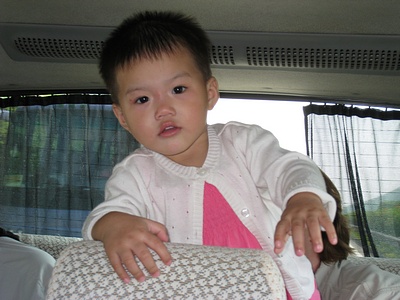


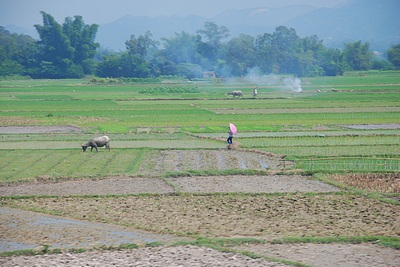
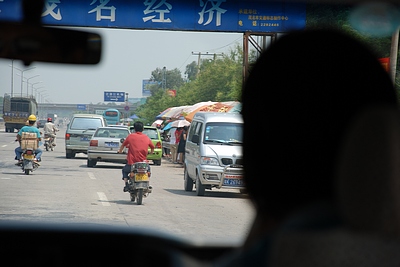

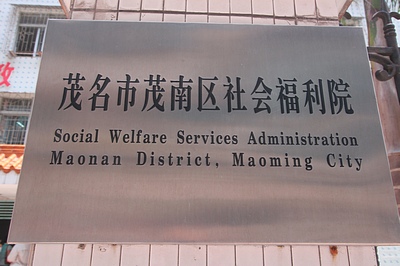
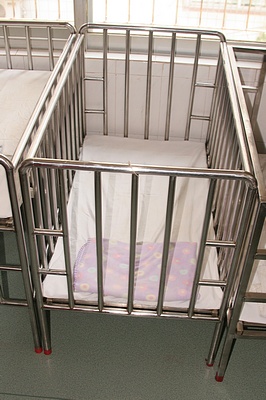
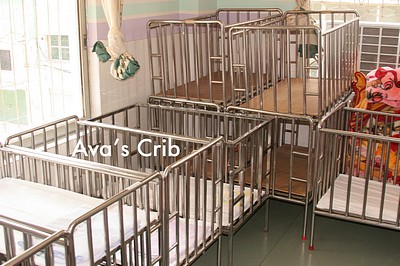
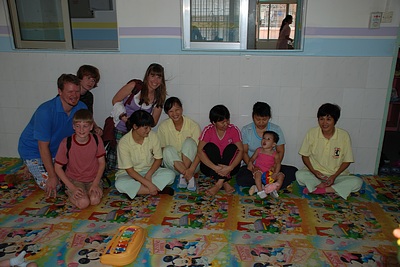
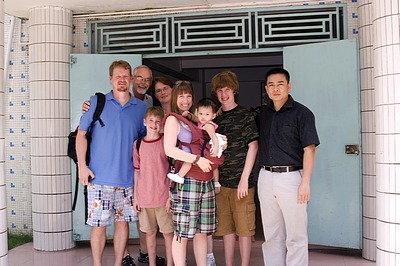
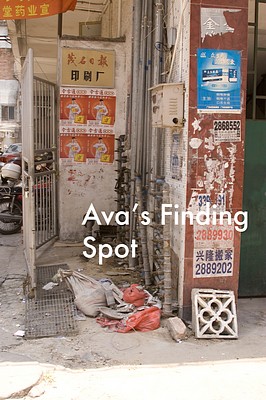
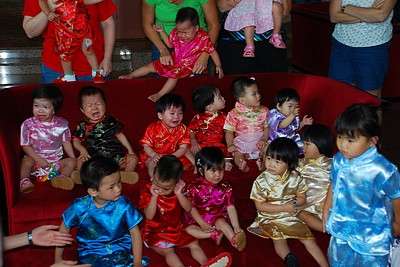
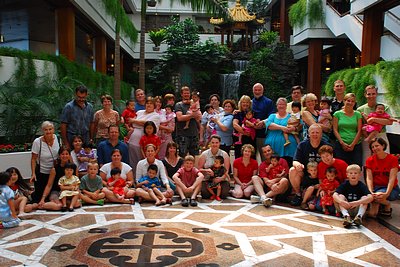
|
We are greeted under Mao's picture by Miss Chen and a lady
who is responsible for record keeping at the orphanage.
Our first stop is the Director's office one floor up. We
had arrived about 10 minutes early so the director was out
for his midday nap. I'm not kidding, in China they take
midday nap breaks. You'll see guys resting in the bed of
their pickup-truck style bicycles all over the streets.
Miss Chen began to serve us tea in his office, but it was
suggested that we head upstairs since the nannies would
soon be breaking for lunch.
Walking upstairs there was a small landing where everyone
removes their shoes. They told us they would simply mop
again since our feet were too big to put in the slippers.
Up we went. Turning right at the top of the stairs we
noticed several sleeping babies laying in cradles in the
hallway. I think there were five of them, all recently
orphaned. One of the babies could have fit his entire
length on my forearm and his head was as small as my fist.
We were instructed to take no pictures or video of the
babies, and no footage in the sleeping rooms. It was a
reasonable request so we complied. There was no reason to
suspect anything wrong here, it's a top-notch facility.
First we went to the sleeping room and found YaYa's crib.
Her crib was near the corner underneath a window. All the
cribs were of simple, tubular metal, stainless steel
construction. They did allow us to snap some pictures of
that. There were nannies playing with some babies on a mat
on the floor. The babies were all fairly placid and
inquisitive. We turned around and went next door to the
play rooms.
THE play room. The play room is where YaYa's referral
pictures were taken several months and 9,000 miles ago.
Yet here we were standing in it. What an unbelievable
feeling. Here we were interacting with the nannies that
she has interacted with for about 17 months. This is a
simple room of block construction with a distinctive
bookshelf painted in light pastels of pink, blue, and
yellow. We memorized every edge of that bookshelf that we
could see in the photos. We would sometimes see a picture
of this room on the internet and get very excited. And
here we were.
We took some time to photograph Theresa and Dave's
daughter Hannah's crib and nannies as well. Their daughter
was in an adjacent room with slightly older children. Most
of the children in this orphanage are younger - infants to
toddlers. There are a few however that are quite a bit
older, perhaps age 10 or so, but they are severely
mentally disabled and unable to care for themselves at
all.
Time to meet the Director. The Director, Mr. Huang
Qingsheng had come up to greet us. Mr. Huang was a short,
fit man who was fairly young, perhaps late thirties. He
gave us a very warm greeting and took some time to explain
their play times and early education. We had noticed that
YaYa picks up a pencil with proper form and loves to draw.
(another reason she'll fit right in with this family). We
then went down to his office once again. Mr. Huang handed
me his business card in the traditional Asian fashion, two
hands extended to hand over the card. I received it with
two hands. He then took out a map to plot out the finding
places for YaYa and her "sister" Hannah. We talked for a
few more minutes and then headed out the door. At the
entrance to the orphanage we paused for some group photos
with Mr. Huang. He and his assistant then jumped in their
vehicle. They were going to personally lead us to the
finding places!
YaYa was abandoned in front of a Maoming news printing
press. Hannah was abandoned in front of a bookstore. Both
were very close to the orphanage in Maonan District (there
are 3 districts in Maoming). We followed Mr. Huang and his
assistant as closely as possible without killing cyclists
or getting killed by trucks. Eventually we ended up
driving down a street that was in bad need of repair,
flipping a U-turn and coming to the correct alleyway.
The printing press had since been abandoned in the past
year, but apparently Mr. Huang had friends there and upon
calling them by cell phone they pinpointed the proper
location. We verified by the old sign overhead that it was
the right location when we arrived. The exact spot was
located off the main street down an alleyway next to the
nondescript entrance. There was lots of garbage here and
quite a few motorcycles and scooters moving in and out. We
took lots of photos of the spot and the surrounding area.
We were very conscience of the fact that we could be being
watched too. With the exception of the hospital in
Huangzhou, we had now traced YaYa's entire history. I
thought a lot about this moment on the ride back to
Guangzhou.
Next it was off to Hannah's finding spot. Hannah was left
in a much more civilized place, near a Xinhua Bookstore in
downtown Maoming. The storefront was very clean and it was
located at a busy intersection. We paused for pictures.
Nearby the bookstore were several motorcyles and their
riders. Shelly explained that they were motorcycle taxis.
For a few Yuan you could hail the driver, rent a helmet (a
construction hard hat) and climb aboard for a ride across
town. The women always sit side saddle and riders rarely
pay the extra for the "helmet". A women hailed one as we
stood there. There were also street vendors in the area
that juice sugar cane and sell it. They put the cane
through a juicer and leave the empty husks to fall in a
basket. Another vendor makes cigarettes out of bamboo.
Imagine a cigarette about 3 feet long and 2 1/2 inches in
diameter. We watched some guy smoking one of those!
Having accomplished our mission, I gave Mr. Huang's
assistant a couple hundred Yuan for some petrol. She
wouldn't accept but I insisted. Then we were informed that
they would like to take us to lunch. They wanted to take
us to a traditional Chinese restaurant but we were
starting to run out of time. We also weren't sure how our
stomachs would take that, so Shelly recommended the only
Western restaurant in Maoming... McMao's.
Contrary to popular belief, McDonald's is NOT the same
everywhere. In Maoming you can order chicken wings and
bowls of corn to go with your meal. the hamburgers have
cucumbers as a dressing. The Happy Meals had the Olympic
Fu Wa figurines for their toys. Not being beef eaters, we
settled on filet o'fish meals. Shelly was kind enough to
translate our orders and Mr. Huang took care of the
funding.
I think we were the only Caucasians in the entire city
that day and we were quite the novelty. Every where we
looked we were being stared at. The easiest way to disarm
the inquisitor was to flash a great big smile. You were
always rewarded with a smile in return and we found the
Maoming citizens to be warm and friendly. All pointed at
YaYa and some would comment about how lucky she was.
Shelly explained that people in outlying cities like
Maoming are still very traditional in their thinking about
child-rearing, which means that boys are preferred to
girls. That explains the high rate of abandonment.
After lunch we thanked our guests profusely and still
managed to carry back 3 cases of dragon fruit, more gifts
from our hosts. Dragon fruit is an interesting exotic
fruit. You have to husk the thing and it looks like a
clear grape inside. You eat the grape-like substance and
spit out the seed. The Chinese love it but I have to admit
to not being exceptionally fond of it.
We gassed up at a petrol station quickly before exiting
Maoming. The driver paid about $6.43 for a liter of gas,
filling the tank for about RMB320. If you do the math that
works out to about $3.62/gallon USD. Apparently our driver
was in a hurry on the way back because he took some
extraordinary risks. At least we slept for about an hour
and a half of it, or we would have been more tense. The
main highway had a normal level of traffic for even an
American divided highway but the traffic close to
Guangzhou was a parking lot and cost us an extra hour.
YaYa is not used to riding in vehicles and pitched a fit
for most of the way. We actually put seatbelts on and had
her strapped in to the Ergo baby carrier I was wearing.
Here eyes are very red still from the screaming. It gave
us a good glimpse of what to expect on the flight home.
Ugh.
Along the way we had seen 3 accidents that were probably
fatal. If you do the research you find out that the
accident rate is actually relatively high. Duh, it doesn't
take a rocket scientist to figure that one out.
In one case all the traffic had settled to a stop because
of an accident. A tour bus was close to the guardrail and
let several people out to do a nature call right there in
front of the rest of the drivers. Shelly said this was
very normal and culturally acceptable. In the US people
would be calling 911.
In another instance a man was relieving himself at the
back of a bus. Just then the bus began to inch forward -
and so did the man, trying to keep pace with his cover as
it drove away from him. We laughed for a good half hour
after that one! Even Shelly found it hilarious.
Our driver began to carve his own path through the
traffic, making lane changes whenever there was sufficient
enough room for the van. During high speed lane changes he
would squeeze in between cars when there was not quite
enough room to pass comfortably. He would actually start
changing lanes before he was beyond the previous car. It
was nuts and we told ourselves to just avoid looking.
Eventually we made it back to the hotel. We all dove to
the pavement and kissed it. (kidding). We were all glad to
be alive and all felt very gratified at having
accomplished our mission. There was also a strong sense of
suspicion and skepticism because the Chinese media doesn't
often allow foreigners to see what it's real issues are
and we saw it first hand in Maoming. All in all, this was
a very rewarding and humbling experience that I would
recommend to any adoptive parent that doesn't mind getting
their fingernails a little dirty.
In the evening we had planned to join the group for a
dinner cruise on the Pearl River had we gotten back on
time. Catherine had phoned Shelly on the way back to say
that it was cancelled due to inclimate weather. The group
was meeting over at La Dolce Vita instead so we had the
driver drop us off there. We had some excellent Italian
food and once again walked the riverfront on the way back.
That's it for today's novel. In yesterday's post I had
mentioned the red couch pictures but didn't have any to
post. I've included them at the end of today's post. Also,
I left out a detail from the medical examination. People
have been asking about YaYa's size. She is 23.1lbs and 32
inches tall. Everything seems to be in order medically,
but we'll have a more thorough exam once we get back. |
Web site by
myadoptionwebsite.com
|